Your Creative Mind
Behind every book, play, and song is a person juggling self-doubt, deadlines, and the drive to create. On Your Creative Mind, Izolda Trakhtenberg talks with writers, artists, musicians, and creative professionals about how they make their work and how they manage the stress and anxiety that often come with creating.
Through candid interviews and practical insights, you’ll learn storytelling techniques, mindfulness practices for creative professionals, and strategies for overcoming perfectionism in writing and art. Whether you’re searching for inspiration, tools to strengthen your resilience, or fresh ideas for balancing creativity and mental health, this podcast is your guide to creating with courage, clarity, and joy.
Episodes
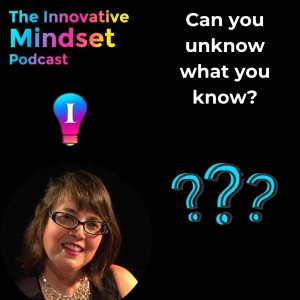
Wednesday Feb 02, 2022
Wednesday Feb 02, 2022
Can you unknow what you know?
How Our Minds Work When Getting New Information and Deciding How to Respond To It
This episode is brought to you by Brain.fm. I love and use brain.fm! It combines music and neuroscience to help me focus, meditate, and even sleep! Because you listen to this show, you can get a free trial and 20% off with this exclusive coupon code: innovativemindset .*URL: https://brain.fm/innovativemindset
Connect with me.
FB author page: https://www.facebook.com/IzoldaSTIG: https://www.instagram.com/izoldat/Twitter: https://twitter.com/IzoldatLI: https://www.linkedin.com/in/izoldat/Website: https://izoldatauthor.com/
Listen on These Channels
Apple Podcasts | Spotify | Stitcher | Google Podcasts | Podbean | MyTuner | iHeart Radio | TuneIn | Deezer | Overcast | PodChaser | Listen Notes | Player FM
I’m thrilled that you’re tuning in to the Innovative Mindset. Get in touch if you have questions or comments.
*Affiliate link. If you purchase it through the above links and take the 20% off, I’ll get a small commission.
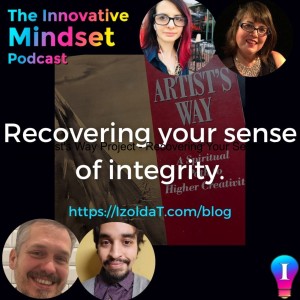
Tuesday Feb 01, 2022
Tuesday Feb 01, 2022
Alan, Izolda, Megan, and Sergio recover a sense of integrity
This week we discuss integrity, self-awareness, more childhood favorite lists, and much more!
Join Alan Fessenden, Megan Vasiles, Sergio Giovanni, and yours truly as we work our way through Julia Cameron’s seminal book. This is week 4 of the 12-week class/process. We discuss our challenges and victories, struggles, and realizations as we discuss the points in the book and our responses to them.
If you want to join in, it’s not too late. Grab a copy of the book wherever you buy books (or check it out from your local library) and go through your own process of creative recovery.
This episode is brought to you by Brain.fm. I love and use brain.fm! It combines music and neuroscience to help me focus, meditate, and even sleep! Because you listen to this show, you can get a free trial and 20% off with this exclusive coupon code: innovativemindset .*URL: https://brain.fm/innovativemindset
Connections
Alan on Instagram
Sergio on Facebook
Megan on Instagram
Izolda on Instagram
Listen on These Channels
Apple Podcasts | Google Podcasts | Spotify | Stitcher | Podbean | MyTuner | iHeart Radio | TuneIn | Deezer | Overcast | PodChaser | Listen Notes
*Affiliate link. If you purchase it through the above links and take the 20% off, I’ll get a small commission.
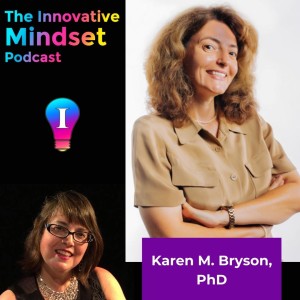
Monday Jan 31, 2022
Monday Jan 31, 2022
Best-selling Author, optioned screenwriter, and Curious Professor Karen M. Bryson, Ph.D. on how stories shape our lives and our world.
KAREN M. BRYSON is an award-winning/optioned screenwriter and USA TODAY bestselling author of over 50 books. She hosts two podcasts, THE CURIOUS PROFESSOR and THE DEAD WRITERS SOCIETY.
This episode is brought to you by Brain.fm. I love and use brain.fm! It combines music and neuroscience to help me focus, meditate, and even sleep! Because you listen to this show, you can get a free trial and 20% off with this exclusive coupon code: innovativemindset .*URL: https://brain.fm/innovativemindset*Affiliate link. If you purchase it through the above links and take the 20% off, I’ll get a small commission.
Karen and her husband are the owners and founders of Short on Time Books, a small boutique publishing company, and Short on Time Academy, where they help coaches, creatives, thought-leaders and entrepreneurs to create buzz for their brands through book authorship and the power of podcasting.
When she not writing or podcasting, Karen works as a tenured university professor and searches for fascinating stories in unusual places.
Connect with Karen
https://www.thecuriousprofessorpodcast.com
https://www.instagram.com/karenmbryson/
https://twitter.com/karenmbryson
https://www.facebook.com/KarenMuellerBrysonAuthor
Connect with me.
FB author page: https://www.facebook.com/IzoldaSTIG: https://www.instagram.com/izoldat/Twitter: https://twitter.com/IzoldatLI: https://www.linkedin.com/in/izoldat/Website: https://izoldatauthor.com/
Listen on These Channels
Apple Podcasts | Spotify | Stitcher | Google Podcasts | Podbean | MyTuner | iHeart Radio | TuneIn | Deezer | Overcast | PodChaser | Listen Notes | Player FM
I’m thrilled that you’re tuning in to the Innovative Mindset. Get in touch if you have questions or comments.
*Affiliate link. If you purchase it through the above links and take the 20% off, I’ll get a small commission.
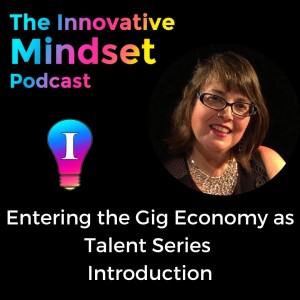
Friday Jan 28, 2022
Friday Jan 28, 2022
Thinking of entering the gig economy as a performing artist? Listen to this introductory episode of the series.
Here's the intro of Agents and the gig economy - what you need to know before you pursue the gig life.
Connect with me.
FB author page: https://www.facebook.com/IzoldaSTIG: https://www.instagram.com/izoldat/Twitter: https://twitter.com/IzoldatLI: https://www.linkedin.com/in/izoldat/Website: https://izoldatauthor.com/
Listen on These Channels
Apple Podcasts | Spotify | Stitcher | Google Podcasts | Podbean | MyTuner | iHeart Radio | TuneIn | Deezer | Overcast | PodChaser | Listen Notes | Player FM
I’m thrilled that you’re tuning in to the Innovative Mindset. Get in touch if you have questions or comments.
*Affiliate link. If you purchase it through the above links and take the 20% off, I’ll get a small commission.
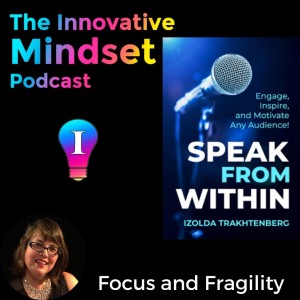
Thursday Jan 27, 2022
Thursday Jan 27, 2022
How Focus and Fragility Improve Your Communication and Presentation Skills
This episode is brought to you by Brain.fm. I love and use brain.fm! It combines music and neuroscience to help me focus, meditate, and even sleep! Because you listen to this show, you can get a free trial and 20% off with this exclusive coupon code: innovativemindset .*URL: https://brain.fm/innovativemindset
Connect with me.
FB author page: https://www.facebook.com/IzoldaSTIG: https://www.instagram.com/izoldat/Twitter: https://twitter.com/IzoldatLI: https://www.linkedin.com/in/izoldat/Website: https://izoldatauthor.com/
Listen on These Channels
Apple Podcasts | Spotify | Stitcher | Google Podcasts | Podbean | MyTuner | iHeart Radio | TuneIn | Deezer | Overcast | PodChaser | Listen Notes | Player FM
I’m thrilled that you’re tuning in to the Innovative Mindset. Get in touch if you have questions or comments.
*Affiliate link. If you purchase it through the above links and take the 20% off, I’ll get a small commission.
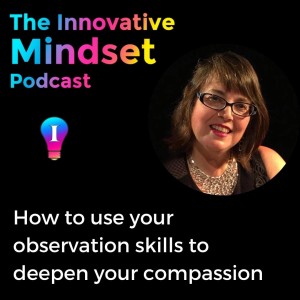
Wednesday Jan 26, 2022
Wednesday Jan 26, 2022
How to Build Your Observation Skills and Supercharge Your Ingenuity at the Same Time
This episode is brought to you by Brain.fm. I love and use brain.fm! It combines music and neuroscience to help me focus, meditate, and even sleep! Because you listen to this show, you can get a free trial and 20% off with this exclusive coupon code: innovativemindset .*URL: https://brain.fm/innovativemindset
Connect with me.
FB author page: https://www.facebook.com/IzoldaSTIG: https://www.instagram.com/izoldat/Twitter: https://twitter.com/IzoldatLI: https://www.linkedin.com/in/izoldat/Website: https://izoldatauthor.com/
Listen on These Channels
Apple Podcasts | Spotify | Stitcher | Google Podcasts | Podbean | MyTuner | iHeart Radio | TuneIn | Deezer | Overcast | PodChaser | Listen Notes | Player FM
I’m thrilled that you’re tuning in to the Innovative Mindset. Get in touch if you have questions or comments.
*Affiliate link. If you purchase it through the above links and take the 20% off, I’ll get a small commission.
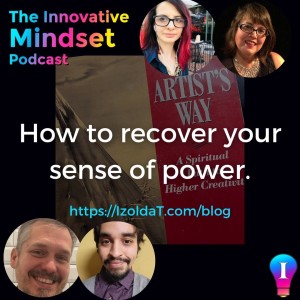
Tuesday Jan 25, 2022
Tuesday Jan 25, 2022
Alan, Izolda, Megan, and Sergio recover a sense of power
This week we discuss power, courage, anger, shame, and much more!
Join Alan Fessenden, Megan Vasiles, Sergio Giovanni, and yours truly as we work our way through Julia Cameron’s seminal book. This week is Week 3 of the 12-week class/process. We discuss our challenges and victories, struggles, and realizations as we discuss the points in the book and our responses to them.
If you want to join in, it’s not too late. Grab a copy of the book wherever you buy books (or check it out from your local library) and go through your own process of creative recovery.
This episode is brought to you by Brain.fm. I love and use brain.fm! It combines music and neuroscience to help me focus, meditate, and even sleep! Because you listen to this show, you can get a free trial and 20% off with this exclusive coupon code: innovativemindset .*URL: https://brain.fm/innovativemindset
Connections
Alan on Instagram
Sergio on Facebook
Megan on Instagram
Izolda on Instagram
Listen on These Channels
Apple Podcasts | Google Podcasts | Spotify | Stitcher | Podbean | MyTuner | iHeart Radio | TuneIn | Deezer | Overcast | PodChaser | Listen Notes
*Affiliate link. If you purchase it through the above links and take the 20% off, I’ll get a small commission.

Monday Jan 24, 2022
Monday Jan 24, 2022
Melissa Rodriguez, Founder of Mel Rodriguez & Co and Social Media Relations on What it Takes to Succeed as a Creative Entrepreneur
Melissa Rodríguez is the founder of Mel Rodriguez & Co, where she works alongside her digital marketing agency, Social Media Relations to help brands digitally connect with the Female, Hispanic, and Millennials audiences. Most recently, Melissa started an organization called EmpowHer to support and encourage the development of young women professionals in Corporate and aspiring Entrepreneurs. To She and EmpowerHer help these women navigate their journey with the tools they need for success. In addition to her donations to local causes, Melissa has partnered with another marketing agency to offer workshops to struggling restaurant owners and small businesses that need tools and guidance on how to transform their brick-and-mortar businesses into viable online platforms. Prior to this Melissa was a Consultant for 6 years with Ernst & Young where she specialized in the Media & Entertainment sector, working alongside clients such as Disney and its subsidiary ESPN. Melissa has transitioned her skillsets towards helping brands with an interest in the Hispanic market, utilize emerging digital trends to stay relevant and at the forefront of these consumers.
Connect with Melissa
https://www.linkedin.com/in/melrodriguezandco/
https://www.instagram.com/smrelationsdotcom/
https://www.instagram.com/melissarinc/
https://www.instagram.com/melissarinc/
https://www.instagram.com/melissarinc/
https://www.smrelations.com/
Connect with me.
FB author page: https://www.facebook.com/IzoldaSTIG: https://www.instagram.com/izoldat/Twitter: https://twitter.com/IzoldatLI: https://www.linkedin.com/in/izoldat/Website: https://izoldatauthor.com/
Listen on These Channels
Apple Podcasts | Spotify | Stitcher | Google Podcasts | Podbean | MyTuner | iHeart Radio | TuneIn | Deezer | Overcast | PodChaser | Listen Notes | Player FM
I’m thrilled that you’re tuning in to the Innovative Mindset. Get in touch if you have questions or comments.
*Affiliate link. If you purchase it through the above links and take the 20% off, I’ll get a small commission.

Friday Jan 21, 2022
Friday Jan 21, 2022
How a sense of wonder will improve your work and your life.
This episode is brought to you by Brain.fm. I love and use brain.fm! It combines music and neuroscience to help me focus, meditate, and even sleep! Because you listen to this show, you can get a free trial and 20% off with this exclusive coupon code: innovativemindset .*URL: https://brain.fm/innovativemindset
Connect with me.
FB author page: https://www.facebook.com/IzoldaSTIG: https://www.instagram.com/izoldat/Twitter: https://twitter.com/IzoldatLI: https://www.linkedin.com/in/izoldat/Website: https://izoldatauthor.com/
Listen on These Channels
Apple Podcasts | Spotify | Stitcher | Google Podcasts | Podbean | MyTuner | iHeart Radio | TuneIn | Deezer | Overcast | PodChaser | Listen Notes | Player FM
I’m thrilled that you’re tuning in to the Innovative Mindset. Get in touch if you have questions or comments.
*Affiliate link. If you purchase it through the above links and take the 20% off, I’ll get a small commission.

Thursday Jan 20, 2022
Thursday Jan 20, 2022
Improve Your Voice's Sound With These Simple Techniques - Speak From Within, Chapter 9
Obviously, when you speak, you want to sound your best. This chapter of the audiobook delves into exactly how to do that with the biggest resonating chamber you have - your body.
This episode is brought to you by Brain.fm. I love and use brain.fm! It combines music and neuroscience to help me focus, meditate, and even sleep! Because you listen to this show, you can get a free trial and 20% off with this exclusive coupon code: innovativemindset .*URL: https://brain.fm/innovativemindset
Connect with me.
FB author page: https://www.facebook.com/IzoldaSTIG: https://www.instagram.com/izoldat/Twitter: https://twitter.com/IzoldatLI: https://www.linkedin.com/in/izoldat/Website: https://izoldatauthor.com/
Liking the Show?
Support the Podcast.
Listen on These Channels
Apple Podcasts | Spotify | Stitcher | Google Podcasts | Podbean | MyTuner | iHeart Radio | TuneIn | Deezer | Overcast | PodChaser | Listen Notes | Player FM
I’m thrilled that you’re tuning in to the Innovative Mindset. Get in touch if you have questions or comments.
*Affiliate link. If you purchase it through the above links and take the 20% off, I’ll get a small commission.







